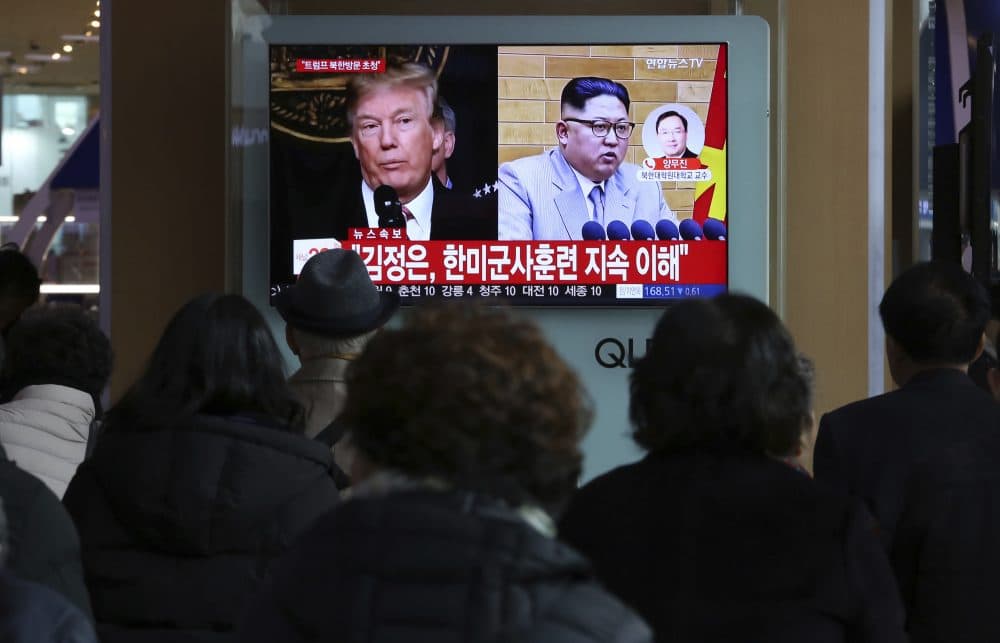Advertisement
Commentary
Is Trump’s Meeting With Kim Jong Un A Good Idea?

The foreign policy establishment choked on its dinner when news came at 7 p.m. last Thursday that President Trump had accepted an invitation from North Korea's Kim Jong Un to meet one-on-one.
In the words of Pepper Brooks in the movie, “Dodge Ball,” "That's a bold strategy … Let's see if it pays off."
The impromptu decision drew the ire of the hawkish neoconservatives, who prefer bombing to talking. Congressional Republicans rushed to take credit for the turn of events, suggesting that the "extreme pressure" strategy had worked — this, despite a lack of any evidence whatsoever and without knowing if the North was, in fact, sincere. Beltway pundits harrumphed that Trump had not followed long-established diplomatic rules for such meetings.
It also left arms control and disarmament advocates confused as to how to react. Should they suddenly praise Trump, the same president who bragged that his button was bigger, had used his U.N. General Assembly speech to threaten and insult a country with nuclear weapons, and had promised a broad expansion of America's own nuclear arsenal?
So, is this a good idea or a bad idea?
It is a high risk, high reward gamble that you might expect from someone with no experience in foreign policy and who, for good or for ill, does not feel encumbered by ossifying decades of process and procedure.
If it works, it would be the most important foreign policy and national security achievement since the end of the Cold War. If it fails, leaving the two sides angry and distrustful, it could put the world on a fast track to war, potentially even nuclear war, which would be the most catastrophic event since 1945, when the United States used nuclear weapons against Japan.
High risk. High reward.
Still, the dangers need to be put in some context. If the United States refused to negotiate with North Korea, there would still be a risk of war. That war could result from miscalculation, misperception or the inadvertent escalation that comes when a small incident balloons out of all proportion, as each side tries to save face or "show resolve." After all, the president and vice president seem obsessed with appearing strong and showing resolve, even if it’s simply through a facial expression.
Advertisement
And as crazy as it sounds, some people in the White House have entertained the idea of deliberately attacking North Korea — employing a so-called "bloody nose" strategy. Victor Cha, the administration's nominee to be U.S. ambassador to South Korea, was reportedly dropped by the White House when he refused to endorse the idea. So summit or no summit, there are real risks going forward.
Moreover, Pyongyang has agreed to suspend missile and nuclear tests during the negotiations, even as it conceded that U.S.-South Korea military exercises might continue. To be sure, the North is very close to having a fully tested nuclear and ICBM capability, but it is not quite there yet, and a freeze on long-range missile tests would halt the program before it achieved that milestone.
But there is no getting around the real peril, either. A successful negotiation will require preparation, patience, persistence and flexibility — traits not normally associated with this White House. Compounding the challenge is the fact that this White House is missing precisely the personnel that would be critical for a serious negotiation: an ambassador in Seoul, a special representative to North Korea, a confirmed assistant secretary for East Asian and Pacific Affairs.
If an impetuous president pursues a take-it-or-leave-it approach, we could quickly hear him saying that he "tried" diplomacy, that it "failed," and that he has no choice but to go all in on a military strike. Trump suggested as much when he said that he was "ready to go hard in either direction."
And that, of course, is the irony. Groundbreaking change on a hard problem suits someone willing to make an unprecedented move, willing to break the rules and do so without consultation. But is that same personality well suited for the hard work of diplomacy?
I don't know. But I am rooting for him. We all should be rooting for him, because if it crashes and burns, we will all face the consequences.
